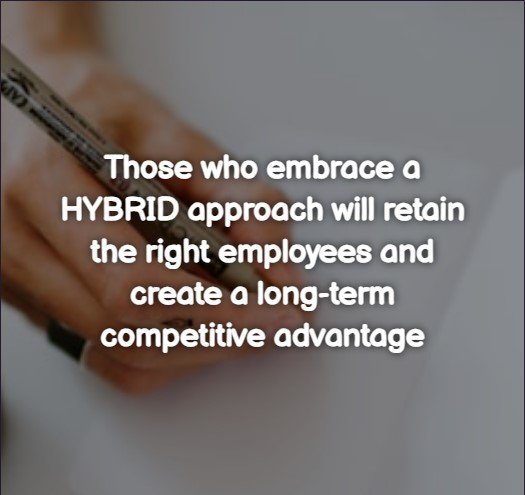On the heels of Amazon’s bombshell RTO (return to office) announcement, I’ve seen dozens of posts by social media heavy hitters extolling the virtues of mandating all employees return to the office. And I’ve seen even MORE posts regarding how mandating a return to office is tantamount to breaking the employer-employee agreement and how everyone should walk out and refuse the terms. There is very little in business that is ever this black and white, and even less that can be applied to all roles in all industries. Based on the conversations I’ve been having with clients, the way forward is a little murky and all these histrionics miss the mark; HYBRID is the wave of the future.
If you’re in a SaaS company that was forced remote during lockdown, you should think long and hard about mandating a return to office. We BOTH know that “camaraderie” and “group collaboration” are nonsense reasons when you’ve been producing deliverables on time for 4 years; you’re just letting your micromanagement tendencies win because you want to “see” your employees working or fill up that office space you don’t really need. If you’re in a big-ticket B2C environment with direct customer contact, more and more people are wanting to come in to put a face with a name. Every day, people are looking for ways to “shop local.” 100% remote might not make sense for you anymore, especially for your sales force (even if they are banging the phones most of the time).
So what’s the answer? I’ll tell you what it ISN’T; making an Amazon-style proclamation without considering both YOUR needs and YOUR EMPLOYEE’S needs (remember them? The ones you say are the lifeblood of your business? Yeah). It is and should always be situational and unique to YOUR COMPANY.

Remember the c-word…COMPROMISE. If you’ve decided that you want more people in the office, consider a flexible, CUSTOMIZED Hybrid approach. People have become accustomed to things like NOT wasting their life commuting, being able to go to the gym at lunch instead of eating another greasy burger and being lethargic afterwards and going to their kids’ soccer game at 5:15 without missing any work. If you have a top performer who lives 50+ miles away, is it worth losing them so everybody plays by the same rules? If you answered “yes”, they weren’t really a top performer. On the other hand, do you have someone who is local who has potential but really needs some extra guidance? Maybe 4 days per week in office splitting time with a mentor and a direct supervisor makes the most sense for them.
Every company is different. Every employee is different. Those who embrace a customized, Hybrid approach will retain the right employees for the long-term.
Thank you for coming to my #FredTalk
